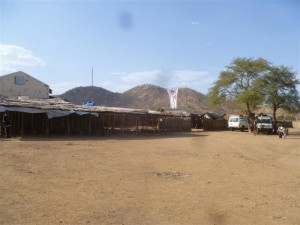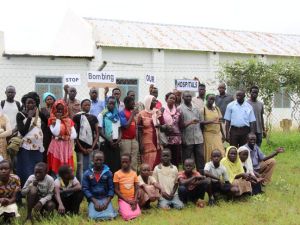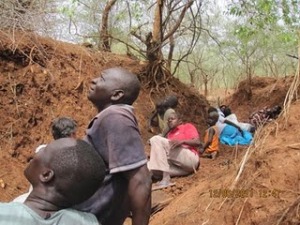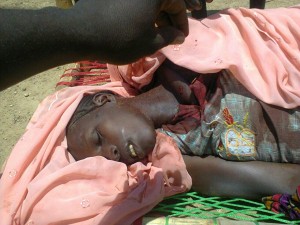SUDAN: MSF-BELGIUM STOPS EMERGENCY AID—
Medical Operations Halted Following Government’s Systematic Denial of Access
BRUSSELS, JANUARY 29, 2015 – The Belgian branch of the international medical humanitarian organization Doctors Without Borders/Médecins Sans Frontières (MSF) today announced the closure of its activities in Sudan due to the Sudanese government’s systematic denial of access to people trapped in conflict areas.
The Brussels-based section of MSF was focusing on three conflict-affected parts of Sudan, where hundreds of thousands of people are displaced and in need of assistance. Total denial of access to Blue Nile State, forced closure of activities in East Darfur State, and administrative obstacles and blockages in South Darfur State have made it impossible for MSF to respond to medical emergencies in these areas. [all emphases have been added]
“The Sudanese government’s approach to an international humanitarian presence in conflict areas of Sudan was starkly revealed last week when a Sudanese Air Force fighter jet targeted and bombed a hospital run by our MSF colleagues in South Kordofan State,” said Dr. Bart Janssens, director of operations for MSF in Brussels. “The government has many ways to shut off our access to the people who are in the greatest need, and it uses them. High level meetings we have attended have made it clear that humanitarian assistance to populations most affected by conflict in Blue Nile State and southern areas of Darfur will continue to will continue to be blocked and restricted as long as military operations are prioritized over humanitarian assistance.”
MSF has been consistently denied access to Blue Nile State, where conflict erupted in the autumn of 2011 between the Sudanese Armed Forces (SAF) and the Sudan People’s Liberation Army–North (SPLA-N) group. In 2011 and 2012, MSF teams in the refugee camps across the border in South Sudan faced a well-documented health catastrophe as some 100,000 Sudanese refugees poured across the border in terror, some having died during the journey and some so weak that they died on arrival in South Sudan. Death rates in the camps reached more than double the recognized emergency mortality thresholds.
Since the conflict began in Blue Nile, this Sudanese state has become a restricted zone, with no international aid workers allowed in.
“The refugees remain trapped, still entirely dependent on humanitarian aid for their survival but terrified of returning to Sudan,” said Dr. Janssens. “We continue to care for those that managed to escape to South Sudan, but our teams in Sudan are not allowed to even assess the needs, let alone provide assistance.”
In December, 2012, MSF team members at the organization’s hospital and mobile clinic project in the town of Shaeria, in East Darfur, were suddenly arrested and removed from the area. Despite numerous requests and high level meetings, no explanation for the arrests have been provided. MSF remains unable to work in the region.
In the El Sereif camp for displaced people near Nyala, the capital of South Darfur, an MSF team has been blocked from providing urgently needed additional emergency capacity. MSF was running a medical project in the camp, but when a new influx of displaced people arrived in March and April 2014, a reinforcement team of emergency specialists was denied travel permits to the camp. At the time, clean water provision in the camp was below one third the recognized emergency minimum and waterborne diseases such as hepatitis E were rife.
“Whether we ask for access through dialogue and meetings, seek negotiations through influential partners of the government, or speak out in media, nothing seems to have the slightest impact,” said Dr. Janssens. “Our experience is that the Sudanese government arranges meetings specifically to prevent international aid, rather than to facilitate it. We have drawn the desperately sad conclusion that under the current circumstances, we cannot carry out emergency and life-saving work in three major conflict-affected parts of Sudan where we are desperately needed.”
The needs related to violence and displacement clearly extend to other areas of Sudan. United Nations figures reveal that in 2014 roughly 400,000 people were newly displaced in the wider Darfur region and that 2.3 million people were displaced throughout the country. Nearly seven million people require humanitarian assistance.
The Brussels-based section of MSF remains committed to providing emergency care to conflict-affected populations in Sudan, and will continue to pursue all avenues available to provide this care.
MSF first began working in Sudan in 1979. Since 2011, the obstacles placed by authorities in the way of humanitarian access have increasingly made the work of the Brussels-based section, which was focusing on Blue Nile State, East Darfur and South Darfur, impossible. Other MSF sections continue to work in Sudan, although the Paris-based MSF section has suspended activities in South Kordofan State until further notice, following the targeted bombing of its hospital in Frandala on January 20, 2015.
Tim Shenk, Press Officer
Doctors Without Borders/Médecins Sans Frontières (MSF)
333 Seventh Avenue, 2nd Floor, New York, NY 10001
Tel: +1 212.763.5764
Cell: +1 646.206.9387
http://twitter.com/timkshenk
http://www.doctorswithoutborders.org
***************************
The MSF hospital in Frandala, South Kordofan–twice bombed by Khartoum, most recently by means of an advanced military jet aircraft (20 January 2015)
This press release has no real need of glossing or amplification; it has been so long in coming, the provocations by Khartoum so egregious and relentless, that MSF/Belgium—painful as the decision must have been—was forced to take the action it did today, suspending humanitarian efforts in two regions of Darfur and in Blue Nile State. Their experience of abuse, harassment, and obstruction is far from unique, and indeed the MSF press release highlights the fact that MSF/France saw its hospital in Frandala, South Kordofan deliberately bombed by one of Khartoum’s advanced military jet aircraft on 20 January 2015—bombed deliberately for the second time.
But if there is nothing to add to the account of what MSF/Belgium has experienced, it remains vital that we recognize why Dr. Janssens is forced to declare in frustration:
“Whether we ask for access through dialogue and meetings, seek negotiations through influential partners of the government, or speak out in media, nothing seems to have the slightest impact.”
Nothing has the “slightest impact” because neither the countries of Europe, nor Canada, nor the United States, nor the UN, nor the African Union, nor any other international actor of consequence is willing to make an “impact” on Khartoum’s thinking. The regime has enjoyed such total impunity, for so many years—extending even to the bombing of civilian hospitals—that it is entirely unreasonable to think that a nongovernmental humanitarian relief organization, which remains in Sudan only at the discretion of a brutal regime, can exert meaningful pressure for a change in the barbaric behavior that is costing tens of thousands of lives every year.
Victims are of all ages, and are assaulted by various means
Hostility toward and assaults on humanitarians and relief efforts have defined the regime in Khartoum since it assumed power as the “National Islamic Front” during a military coup in June 1989—more than twenty-five years ago. Hospitals and humanitarian field operations have been a particular target of aerial military assaults during the regime’s entire time in power (see www.sudanbombing.org/). Obstruction, harassment, expulsions, beatings, asset-stripping, killings, rape, and other offenses organized or conducted by the regime are a way of life in Sudan—and there is no sign of change, as the international community imposes no costs on Khartoum for its countless, well-documented atrocity crimes.
[Today, 29 January 2015, Human Rights Watch released its annual human rights report, a document in which the abuses of the Sudan Armed Forces, its militia allies, and the regime’s repressive security apparatus are detailed with unsurpassable authority. To read Human Rights Watch’s World Report 2015 chapter on Sudan, see |
http://www.hrw.org/world-
Indeed, during the closing days of 2014 there were ominous signs that the regime was escalating its war on humanitarian relief efforts in Sudan—efforts to feed, provide medical care, clean water, and shelter for Sudanese civilians, people who otherwise have few or no resources. We may be seeing a culmination of efforts that were most dramatically embodied in the March 2009 expulsion from Darfur of thirteen of the world’s finest humanitarian organizations, including two from MSF (Holland and France). This represented roughly half the total humanitarian capacity in Darfur at the time, and relief efforts have never fully recovered.
More humanitarian organizations have been subsequently expelled: Médecins du Monde—the only medical relief organization serving the embattled civilian population of Jebel Marra in central Darfur—was expelled by Khartoum in early 2010. And some organizations have quietly withdrawn, unwilling to accept any longer the intolerable insecurity Khartoum has engineered throughout Darfur, particularly at present in North Darfur. In 2014 there were further expulsions of organizations, including Merlin (UK), which was expelled simply because it took over from one of the organizations expelled in 2009 (Save the Children/USA). This was an especially serious blow to humanitarian capacity in West Darfur.
On March 19, 2014 Radio Dabanga reported that the National Islamic Front/National Congress Party regime was expelling the French organization Agency for Technical Cooperation and Development (ACTED) from Darfur:
ACTED provides support to the displaced people in Zalingei, including water and sanitation for the camps and the surrounding villages before the rain season starts. “At least 50 members of the national staff are employed in the Central Darfur office,” a local staff member said. According to its website, the programme has 83 national staff and 3 internationals working in Sudan. “The action against ACTED comes at a critical time,” the [ACTED] staff member told Radio Dabanga.
And now MSF/Belgium is suspending its operation in South Darfur and East Darfur because of Khartoum’s “systematic denial of access to people trapped in conflict areas.”
Typically overlooked in humanitarian assessments of Sudan as a whole are the deeply impoverished eastern states, particularly Red Sea and Kassala, home to some of the most under-served and most severely marginalized of all the regions in Sudan. Malnutrition rates there are in some cases as bad as those in Darfur. There is a total lack of news and human rights reporting, and the last dispatch of significance may be the following from Sudan Tribune:
Sudan’s Humanitarian Aid Commission (HAC) has ordered seven foreign aid groups to suspend their humanitarian activities in eastern Sudan following the findings of an assessment study reporting infractions they allegedly committed…. [The decision ended] the humanitarian activities of the seven aid groups in the three states of Eastern Sudan region: Kassala; Red Sea and Gadaref states. [The seven organizations are] Accord, Goal, Triangle, Save the Children, Plan Sudan, Malo, a British demining group, and a Japanese aid group. (31 May 2012)
At the same time, former senior presidential assistant Nafi’e Ali Nafi’e gave us a clear (if geographically ambiguous) sense of the attitudes towards humanitarian efforts to help civilians in South Kordofan and Blue Nile, where the lack of relief assistance to many hundreds of thousands of people has produced starvation, along with extreme levels of malnutrition, disease (especially among young children), and massive human displacement into South Sudan and Ethiopia:
Earlier in May, addressing a rally organised in Port Sudan to provide support to the Sudan Armed Forces (SAF) Sudanese presidential assistant Nafi’e Ali Nafi’e denounced call for the return of NGOs to South Kordofan and described them “trumpeters of conspiracy.” “Those who covet that foreign aid groups have a foothold in the East (Sudan) they should know there is no place for them,” he further said. (31 May 2012)
I have argued repeatedly and at length that the deliberate and systematic denial of humanitarian relief to large civilian populations constitutes a crime against humanity as defined by the Rome Treaty that is the statutory basis for the International Criminal Court. Both the President of this savage regime and its minister of defense have been indicted by the ICC for crimes against humanity in Darfur; but we diminish the potential of the Court if we do not press for investigation of all that comes under this terrible rubric.
See for background:
• “On the Obstruction of Humanitarian Aid,” African Studies Review, Volume 54, Number 3 (December 2011), pages 165 – 74 | http://wp.me/p45rOG-I6
• “They Bombed Everything That Moved”: Aerial military attacks on civilians and humanitarians in Sudan, 1999 – 2013 (see especially pp. 19 – 20) | www.sudanbombing.org
• “Humanitarian Organizations Working in Darfur Continue to be Targeted for Expulsion,” Sudan Tribune, 20 April 2014 | http://www.sudantribune.com/spip.php?article50718
• Humanitarian Conditions in Darfur: Relief Efforts Perilously Close to Collapse (in to parts, with topical appendices), 16 August 2013:
Part 1 | http://wp.me/p45rOG-15l
Part 2 | http://wp.me/p45rOG-15f
Appendices | http://wp.me/p45rOG-14Q
• “A UN Seat for Genocide,” The Washington Post, 15 August 2000 | http://wp.me/p45rOG-gM
(excerpts; Khartoum at the time was—unsuccessfully—seeking a seat on the UN Security Council)
[T]he Khartoum regime has also escalated its assaults on humanitarian efforts. It is attacking, with much greater frequency, the medical and food relief programs of those trying heroically to save the people of the south from disease and starvation. Many of the hospitals and clinics that have been targeted are run by the world’s finest humanitarian organizations.
The International Committee of the Red Cross (ICRC) is but one example. Its clinic at Chelkou, in one of the most distressed regions of southern Sudan, was deliberately bombed on July 14. Reliable sources confirm that there was no military presence near Chelkou. Moreover, as part of its standard protocol, the ICRC had fully apprised the Khartoum regime of its presence in Chelkou and had secured permission. It was bombed anyway.
On July 25, some 200 miles to the southeast in the village of Billing, the Khartoum regime again bombed the Red Cross. Pilots on the ground, who had an approved flight plan from Khartoum, heard the bombers coming and desperately spread out a large Red Cross flag on the ground. It did no good. The bombs fell anyway.



